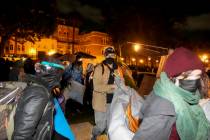Budget tops sheriff’s priorities
On a wall in his office, Sheriff Doug Gillespie keeps a white board to remind him of his top three priorities.
At the bottom is getting re-elected, followed by information sharing among law enforcement agencies. At the top -- as it has been for months -- is the budget.
With the Las Vegas economy flagging and tax revenues plummeting, the man heading the Metropolitan Police Department said he worries about the bottom line every day.
In the past year he's ordered budget cuts, including holding dozens of police officer and civilian positions vacant, that have saved more than $40 million. But as Gillespie prepares the budget for the fiscal year starting July 1, he knows even those significant cuts won't be enough to cut 5 percent off the budget and absorb a 16 percent drop in property tax revenues.
For the new budget, he plans to eliminate 30 police officer positions and more than 100 civilian positions from the general fund budget.
Also, 10 police positions funded by the More Cops sales tax will be cut to avoid potential questions about supplanting money from the general fund, which is prohibited under state law. The More Cops fund pays for about 600 of the 2,900 officers on the force.
With those moves, along with the other cuts, Gillespie said he hopes to avoid layoffs so his employees can focus on doing their jobs, not worry about whether they're going to keep them.
"To eliminate positions was not an easy decision, but I also understand we had to be part of the solution," he said.
The position cuts can be made in part because of drops in calls for service and overall crime last year, he said.
A year ago Gillespie cut $18.6 million from his agency budget to limit the fiscal year 2009-10 budget to $549 million, which was the same as the prior year. That budget could have been higher, but the conservative sheriff held back.
"I wasn't convinced that the economy wouldn't continue to tumble," Gillespie said.
For the 2010-11 fiscal year budget, officials from Las Vegas and Clark County, which fund about 70 percent of the Police Department budget, have asked the sheriff to slice 5 percent, about $27 million, off last year's number. The Police Department also plans to absorb a $26 million drop in property tax revenue, which funds about 30 percent of its budget.
Thanks to cuts in the current and prior fiscal years, the Police Department will carry a surplus of roughly $52 million into the next fiscal year, Budget Director Rich Hoggan said.
Half of that will go to cover the property tax shortfall with most of the rest going to the workers' compensation fund and tenant improvements at the Police Department's new headquarters, which will open in mid-2011, he said.
Police officials plan to keep $4 million of that in reserve.
The sheriff will present the tentative budget on Feb. 22 to the Police Department's Committee on Fiscal Affairs, which includes two Las Vegas city councilmen and two Clark County commissioners.
Gillespie said his agency started planning for the worst-case financial scenario two summers ago when gasoline prices rocketed past $3 a gallon. Valley home prices were still soaring then, but the sheriff ordered his staff to prioritize needs in case cuts had to be made to absorb climbing gasoline costs.
The economy soon collapsed, along with gasoline prices, but those lists of priorities have been instrumental in saving money throughout the financial doldrums since.
Millions of dollars have been saved by slashing travel and training, keeping positions vacant, lengthening replacement schedules for computers and unmarked vehicles, and even canceling three police academies this spring.
Those academies will be scheduled in the next fiscal year to fill about 100 vacant police officer positions.
Yet the agency responsible for policing Las Vegas and unincorporated Clark County has fixed costs that cannot be cut without sacrificing public safety, Gillespie said.
"You can't just quit buying cars," he said. "You can't quit buying gas. You've got to fly helicopters."
Critical units such as patrol, SWAT and homicide will not be cut, he said.
However, officials with the Police Department's three employee unions expect their members to again make sacrifices when contract negotiations begin later this month. They all gave up cost-of-living raises under similar circumstances a year ago.
"We feel we did our part last year, and we'll do our part this year," said Lt. Paul C. Page, chairman of the Police Supervisors and Managers Association, which represents about 450 police sergeants, lieutenants and captains.
Terri Yada, president of the union representing the agency's 1,500 civilian employees, said her members worry about their jobs and work harder to overcome vacancies, but they acknowledge the fiscal realities.
"If there's no money, there's no money," she said.
The executive director of the union representing the Police Department's 2,500 rank-and-file officers said they are prepared to give up some cost-of-living raises but don't want to see deep cuts to their salaries.
"They understand the economy of the valley," Chris Collins said. "They understand the coffers don't have the money for them to get the raises we're accustomed to."
Like last year, Collins plans to agree to a one-year contract and hope the economy rebounds before negotiations begin in 2011.
Several members of the Committee on Fiscal Affairs praised the sheriff for his cost cutting and his willingness to work with city and county officials in dealing with the budget crisis.
Las Vegas City Councilman Steve Wolfson, who sits on the committee, also praised Gillespie's willingness to talk openly about his budget, including plans to hold three town hall meetings this month.
"He's trying to educate the public and educate his officers," he said. "There's only so much money to go around."
Contact reporter Brian Haynes at bhaynes@reviewjournal.com or 702-383-0281.
TOWN HALL MEETINGS SET
Sheriff Doug Gillespie will hold three town hall meetings this month to discuss the budget for the Metropolitan Police Department, which polices Las Vegas and unincorporated Clark County.
Tuesday, Feb. 9: 6 p.m. at Faith Lutheran Junior-Senior High School, 2015 S. Hualapai Way.
Monday, Feb. 22: 6 p.m. at Sierra Vista High School, 8100 W. Robindale Road .
Thursday, Feb. 25: 6 p.m. at Whitney Library, 5175 E. Tropicana Ave.
LAS VEGAS REVIEW-JOURNAL























